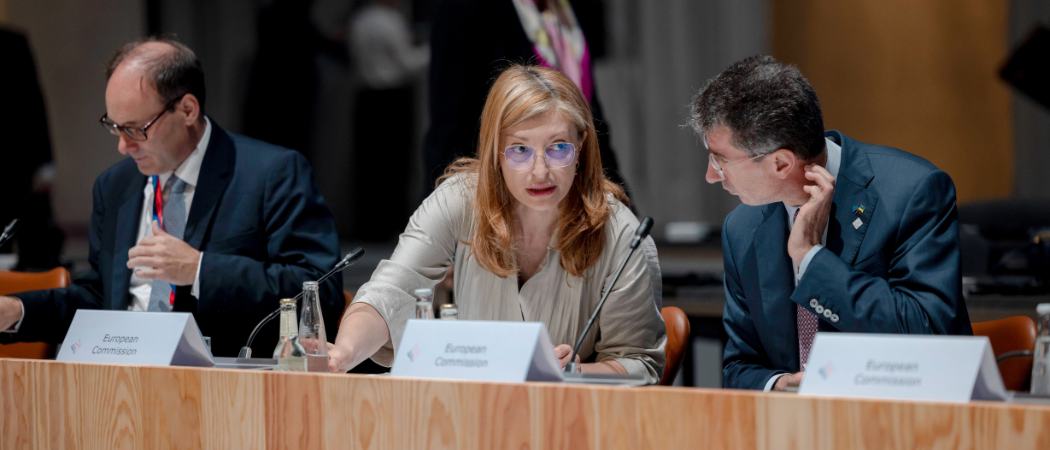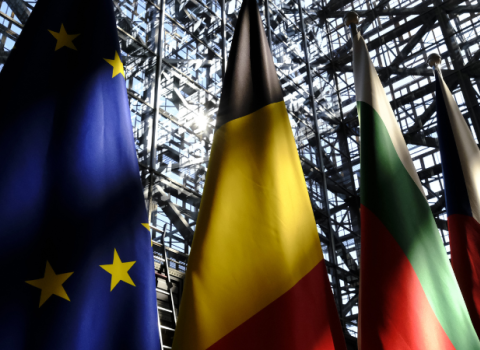Support for bottom-up research will remain strong, despite Horizon Europe’s focus on strategic priorities, says research commissioner

Ekaterina Zaharieva (centre), EU commissioner responsible for research and innovation, during the informal meeting of competitiveness ministers in Copenhagen, Denmark, on July 17. Photo credits: European Union
Dual-use projects will be supported across the whole of the next Horizon Europe programme, and not just under the European Innovation Council (EIC), as previously announced.
“Like all parts of the future budget, Horizon will be open to dual use by default,” said Ekaterina Zaharieva, the European commissioner responsible for research and innovation. “The division between civil and defence applications is very often artificial, and [. . .] we cannot miss out on the potential of research and innovation to make Europeans safer.”
She was presenting the details of the European Commission’s proposal for the next Framework Programme to the press following an informal meeting with EU research ministers in Copenhagen on July 17. Publication of the Horizon Europe proposal followed the presentation of the overall long-term EU budget proposal on July 16.
This is the first time a Commission representative has explicitly confirmed that the 40-year-old rule restricting the Framework Programmes to projects with civilian applications will be scrapped. Previously, only an exemption for the EIC had been put forward by the Commission.
Under the new proposal, the EIC will include support for defence and dual-use start-ups, modelled on the US Defense Advanced Research Projects Agency (DARPA). Pillar 2 of Horizon Europe, which funds collaborative research, will meanwhile be structured around the four policy “windows” of the European Competitiveness Fund (ECF), including one dedicated to resilience and security, the defence industry and space.
Under the EIC, which will see its budget tripled if the Commission has its way, “we will empower programme managers to back high-risk, high-reward projects,” Zaharieva said, in another nod to the DARPA model.
Research freedom
The commissioner also sought to clarify the link between Horizon and the ECF, where a lack of details has caused research stakeholders to temper their enthusiasm for the proposal. The ECF will complement Horizon Europe by supporting deployment of the results of research and innovation projects, she said. However, it is still not clear exactly how the ECF will influence Horizon funding calls.
Despite this new focus on strategic priorities, Zaharieva insisted Pillar 1 of the programme, dedicated to excellent science, would continue to fund bottom-up research. It will include “a strong independent European Research Council, by scientists for science, with a bottom-up approach with freedom of research without political interference,” she said.
Related articles:
- Commission puts forward €175B budget for FP10
- Praise for Commission’s research programme proposal, but concerns linger over its vagueness
Overall, the Commission is proposing to almost double the budget of the current Horizon Europe programme to €175 billion over seven years. “We think it’s not a luxury, it’s a necessity. Today, nearly seven in 10 high-quality proposals go underfunded due to the lack of budget in Horizon. These are potentially life-changing solutions that will never reach Europeans,” Zaharieva said.
“We will increase fundamental research funding, because there is no deep tech without deep knowledge, no competitiveness without science,” she added, citing the example of the quantum industry, where Europe has a chance to play a leading role thanks to its scientific excellence.
Member states positive
The plans were warmly welcomed by research ministers, although much will ultimately come down to the finance ministers who will negotiate the overall EU budget.
The member states “are very happy that the Commission has laid out a very ambitious proposal when it comes to Horizon Europe,” said Christina Egelund, minister for higher education and science for Denmark, which currently holds the EU Council presidency.
“For some time, we didn’t know whether there would be a future [for] Horizon Europe, [. . .] so we are really happy that it will survive as a standalone programme, and even more so with a substantial and very ambitious budget,” Egelund said during the joint press conference.
The expanded budget is “a clear and very positive signal” that science and technology will be high on the agenda when addressing the challenges Europe is facing, she said.
Once formal negotiations among member states begin, the distribution of the budget across the different pillars of Horizon Europe will be up for discussion. Earlier this month, nine EU research ministers, led by those from Spain and Germany, sent a letter to Zaharieva urging her to ensure collaborative research remains a top funding priority. On July 16, France became the tenth signatory of the letter.





 A unique international forum for public research organisations and companies to connect their external engagement with strategic interests around their R&D system.
A unique international forum for public research organisations and companies to connect their external engagement with strategic interests around their R&D system.